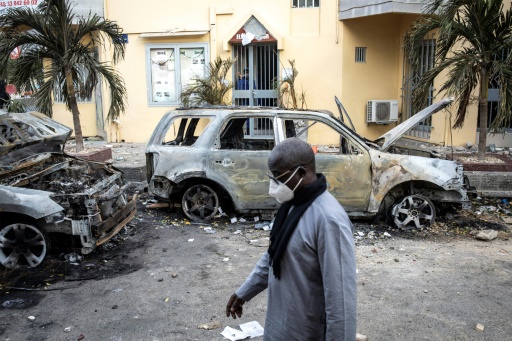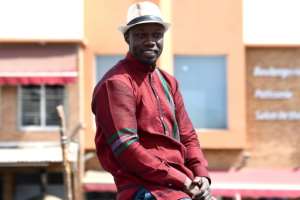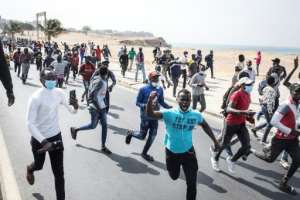
[ad_1]
Senegalese opposition leader Ousmane Sonko was taken into custody during a hearing on Friday, two days after his arrest sparked the worst violence in the country in years.
Burned cars littered some streets of Dakar and key buildings were covered with security before his hearing, following unrest in a country long considered the beacon of West African stability.
Numerous police deployments were in place around the courthouse, the presidential palace and the National Assembly in the heart of the Senegalese capital.
“Sonko was returned to police custody for disturbing public order,” lawyer Etienne Ndione told reporters.
Supporters of Sonko, a former presidential candidate who is seen as a key challenger to President Macky Sall, had called for new protests to coincide with a hearing.
 Senegalese opposition presidential candidate Ousmane Sonko is a popular spokesperson for young people. By SEYLLOU (AFP)
Senegalese opposition presidential candidate Ousmane Sonko is a popular spokesperson for young people. By SEYLLOU (AFP) Clashes erupted between Sonko’s supporters and police on Wednesday as he went to court to face rape charges against him – allegations he denies.
Sonko was subsequently arrested for disturbing public order, a development that sparked protests of anger in the capital and other towns.
The custody order issued on Friday, which specifically concerns the public order case, expires on Sunday.
He was not charged in the rape case on Friday and is returning to court on Monday for questioning on the charges, his lawyers said.
Sonko is targeted “for attempting to eliminate a political rival,” said Abdoulaye Tall, another of his lawyers.
Violence in the south
One person died Thursday in the southern town of Bignona, police said in clashes.
A local official in Yeumbeul, a suburb of Dakar, said a second person had died, and social media said the individual was a teenager.
Protesters attacked the offices of the government daily Le Soleil and RFM radio, which belongs to a press group belonging to singer and former minister Youssou Ndour. Both media are seen as pro-government.
Stores of a French supermarket chain were also attacked and French schools in Dakar were closed on Friday.
Popular firebrand
Sonko, a devout 46-year-old Muslim and leader of the opposition Pastef party, is popular with many young Senegalese because of his scathing attacks on the elite, especially President Sall.
He came third to Sall in the 2019 election.
But his political future was suddenly clouded over last month when rape charges were filed against him by a worker at a salon where, he said, he went for a back massage.
He denies the charges and accuses Sall of conspiring to keep him out of politics.
The government denounced Thursday evening “acts of violence, looting and destruction” of property and warned that it would take “all necessary measures to maintain public order”.
He also cautioned “some media” against continuing what he called “biased” coverage of events.
Regulatory authorities suspended two local television stations, Sen TV and Walf TV, for 72 hours, accusing them of relentlessly broadcasting footage of the unrest.
In a statement, Amnesty International called on the Senegalese authorities “to immediately put an end to the arbitrary arrests of opponents and activists, to respect the freedom of peaceful assembly and freedom of expression”.
 Supporters of Senegalese opposition leader Ousmane Sonko clashed with police on Wednesday. By JOHN WESSELS (AFP)
Supporters of Senegalese opposition leader Ousmane Sonko clashed with police on Wednesday. By JOHN WESSELS (AFP) He also urged the authorities to “shed light on the presence of men armed with batons next to the security forces”.
Netblocks, an organization that monitors internet disruptions, said social media and messaging apps, including Facebook, YouTube and WhatsApp, have been affected by restrictions.
Source link